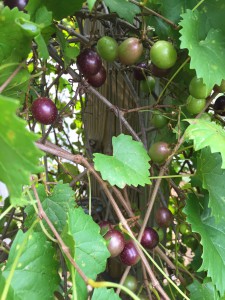The muscadine grape is a popular fruit that grows very well here in North Florida. It has smaller leaves than bunch grapes and fruit are harvested singly, rather than in bunches. Theses grapes can be enjoyed fresh and also be used for home wine-making. One of the nice things about growing muscadine grapes in Florida is that they’re rarely bothered by insects or diseases. They can easily be grown in your backyard garden.
Grapes will grow well in a variety of soils here in North Florida. Upland soils with clay underlying at about three feet are ideal. You should avoid poorly drained soils. If the grapes are grown on soil with very good drainage, they should be set in the ground deeper than they were grown in the nursery on land with a high water table. Grapes should be planted on raised beds at the same depth they were at in the nursery.
During the first year, grapes should be fertilized with a quarter pound of 8-8-8 or 10-10-10 fertilizer, applied in bands about a foot away from the plant, soon after growth begins. Repeat applications in April, July and September. Fertilizer rates increase each year, but they should never exceed six pounds per vine per year.
Weeds can sometimes be a problem with muscadine grapes. To get rid of weeds, you can use a good herbicide, or you can cultivate around the plants. The muscadine grape has a very shallow root system, however, so be careful when you’re weeding around the plants. Mulches can be helpful in controlling weeds, but be sure to leave a circle of at least six inches around each vine uncovered.
Grapes need a generous supply of water to survive here in North Florida. In fact, more first-year grapes die from a lack of water than from any other cause. Make sure the plant receives about an inch of water weekly. Muscadine grapes are rarely bothered by insects or diseases. However, a spray program is advised to protect plants from possible damage by black rot or bitter rot. Spraying should begin when the vines are in bloom, and continue a regular two week intervals until about a week before the harvest. For specific information on the proper spray to use, you should contact your local County Agent.
Muscadine grapes mature in August and early September. If you don’t plan to use them immediately, they should be picked from the vine when ripe and stored at 40 degrees Fahrenheit.
For more information, please see:
Muscadines Benefit from Timely and Artful Pruning
- Muscadine Grape: a Popular Fruit for North Florida - August 10, 2015
- Southern Field Peas, a Summer Delight - July 14, 2015
- Caterpillars with a Sting - June 10, 2015

